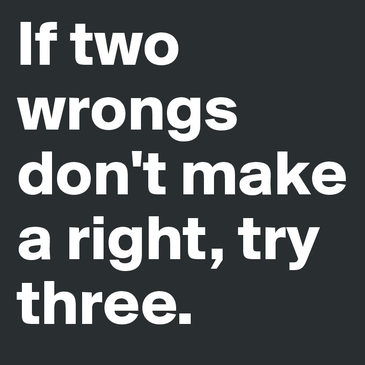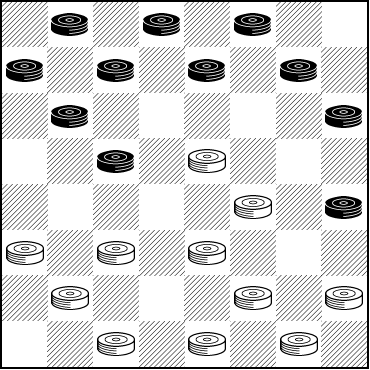The Checker Maven
Jump to navigationThree Wrongs, One Right

Two wrongs don't make a right, we're told, and if so, surely three wrongs don't, either. A third wrong will only lead to even more trouble--- or in the case of our game of checkers, a loss--- and that leads us to this week's four-fold problem.
We'll look at a published game from years back, in which three wrongs weren't counterbalanced by a right (until today, at least).
| 1. | 11-15 | 22-18 |
| 2. | 15x22 | 25x18 |
| 3. | 12-16 | 29-25 |
| 4. | 10-14 | 24-19 |
| 5. | 8-12 | 26-22 |
| 6. | 4-8 | 18-15 |
| 7. | 16-20 |

WHITE
White to Play and Draw
W:W15,19,21,22,23,25,27,28,30,31,32:B1,2,3,5,6,7,8,9,12,14,20.
At this juncture, White played 23-18, and annotator Gary Garwood called it a weak move. He suggested instead 31-26 or 22-18. But these moves are just as bad. All three of them lose. Three wrongs, no right. But in fact there is a right move and White can obtain a draw here.
Can you find the correct move to draw for White, and then (for extra credit, if you will) show the Black wins for all three incorrect moves? It's a tall assignment, but one that will give you quite a bit of checker insight.
When you're right (and you know it, as the saying goes) do the right thing by clicking your mouse on Read More to see the solutions.![]()
Solution
First we'll look at the move actually played, 23-18:
| 7. | ... | 23-18 |
| 8. | 14x23 | 27x18 |
| 9. | 7-10 | 32-27 |
| 10. | 3-7 | 28-24 |
| 11. | 9-13 | 21-17 |
| 12. | 5-9 | 31-26 |
| 13. | 7-1 |
White hasn't got much left to play; 25-21 allows a 2 for 1 with 9-14.
| 13. | ... | 26-23 |
| 14. | 1-5 | 25-21 |
Stopping one 2 for 1 simply allows another.
| 15. | 9-14 | 18x9 |
| 16. | 11x25 | 17-14 |
| 17. | 10x17 | 21x14 |
| 18. | 8-11 | 30x21 |
| 19. | 11-16 | 19-15 |
| 20. | 16-19 | 23x16 |
| 21. | 12x28 |
Black Wins.
How about 31-26?
| 7. | ... | 31-26 |
| 8. | 7-10 | 22-18 |
| 9. | 9-13 | 18x9 |
| 10. | 5x14 | 26-22 |
| 11. | 1-5 | 23-18 |
| 12. | 14x23 | 27x18 |
| 13. | 5-9 | 30-26 |
| 14. | 10-14 | 26-23 |
| 15. | 2-7 | 32-27 |
| 16. | 7-10 |
White has no safe moves and must lose a man, e.g. 28-24 17. 12-16 19x12 18. 10x26 Black wins.
Maybe 22-18?
| 7. | ... | 22-18 |
| 8. | 7-10 | 25-22 |
| 9. | 12-16 | 19x12 |
| 10. | 10x26 | 30x23 |
| 11. | 8-11 | 27-24 |
| 12. | 20x27 | 31x24 |
| 13. | 9-13 | 18x9 |
| 14. | 5x14 | 24-20 |
| 15. | 11-15 |
White's position looks anemic.
| 15. | ... | 32-27 |
| 16. | 6-10 |
White now has nothing good.
| 16. | ... | 27-24 |
| 17. | 2-7 | 24-19 |
| 18. | 15x24 | 28x19 |
| 19. | 14-17 | 21x14 |
| 20. | 10x26 |
Black wins.
The way to a draw goes like this:
| 7. | ... | 28-24! |
| 8. | 9-13 | 15-10 |
| 9. | 6x15 | 19x10 |
| 10. | 8-11 | 24-19 |
| 11. | 11-15 |
Careful; 2-6 would lose to 19-15.
| 11. | ... | 32-28 |
| 12. | 15x24 | 28x19 |
| 13. | 5-9 | 19-15 |
| 14. | 2-6 | 27-24 |
| 15. | 20x27 | 31x24 |
| 16. | 12-16 | 15-11 |
| 17. | 6x15 | 11x2 |
| 18. | 16-20 | 23-19 |
| 19. | 20x27 | 19x10 |
| 20. | 27-31 | 2-7 |
| 21. | 31-27 | 7-11 |
| 22. | 27-23 | 11-16 |
Etc. It's a draw with careful play on both sides.
How did you do on this one? We wouldn't call it easy, and we don't think we're wrong!
You can email the Webmaster with comments on this article.
